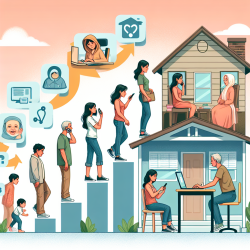Introduction
In the realm of healthcare, the emotional landscape can be as complex as the physical one. Medical professionals often find themselves at the crossroads of life and death, where their ability to support grieving patients and families becomes as crucial as their clinical skills. The research article, "Being there: protocol for a scoping review of the medical education literature on grief support training for medical professionals," highlights a significant gap in medical education regarding grief support training. This blog explores the outcomes of this research and encourages practitioners to delve deeper into this essential aspect of patient care.
The Need for Grief Support Training
Grief is a natural response to loss, yet it can manifest in various forms, such as delayed or prolonged grief, which can lead to increased morbidity and mortality. The Diagnostic and Statistical Manual of Mental Disorders, Fifth Edition (DSM-5), acknowledges the diversity in grief responses, emphasizing the need for medical professionals to differentiate between grief and conditions like depression or anxiety.
Despite the critical role physicians play in supporting grieving patients, many medical professionals feel inadequately prepared to address these issues. The research underscores the lack of standardized grief training in medical schools, particularly in disciplines such as pediatrics, family medicine, and psychiatry, where prolonged patient engagement is common.
Implementing Research Outcomes
The scoping review aims to map the current landscape of grief training and identify gaps in medical education. Here are some strategies practitioners can implement to enhance their skills in grief support:
- Engage in Reflective Practices: Encourage self-reflection among medical students and professionals to help them understand their attitudes towards death and dying. Reflection activities can enhance empathy and improve the ability to support grieving patients.
- Participate in Continuing Education: Seek out workshops, webinars, and conferences focused on grief support training. These platforms provide opportunities to learn from experts and peers, sharing experiences and strategies for effective grief management.
- Advocate for Curriculum Development: Work with educational institutions to integrate grief support training into medical curricula. Highlight the importance of this training in improving patient care and reducing physician burnout.
- Utilize Multidisciplinary Approaches: Collaborate with mental health professionals to gain insights into grief counseling techniques. This interdisciplinary approach can enrich a physician's ability to support patients holistically.
Encouraging Further Research
The scoping review sets the stage for further research into grief support training. Medical professionals are encouraged to contribute to this growing body of knowledge by:
- Conducting Studies: Investigate the effectiveness of different grief training programs and their impact on patient and physician wellness.
- Publishing Findings: Share research outcomes in academic journals to promote awareness and drive change in medical education.
- Networking with Peers: Join professional organizations and online forums dedicated to grief support. These networks can provide valuable resources and foster collaborative research efforts.
Conclusion
Grief support is an essential skill for medical professionals, yet it remains underrepresented in medical education. By implementing the outcomes of the scoping review and engaging in further research, practitioners can enhance their ability to support grieving patients and families. This not only improves patient care but also contributes to the well-being of healthcare providers.
To read the original research paper, please follow this link: Being there: protocol for a scoping review of the medical education literature on grief support training for medical professionals.










